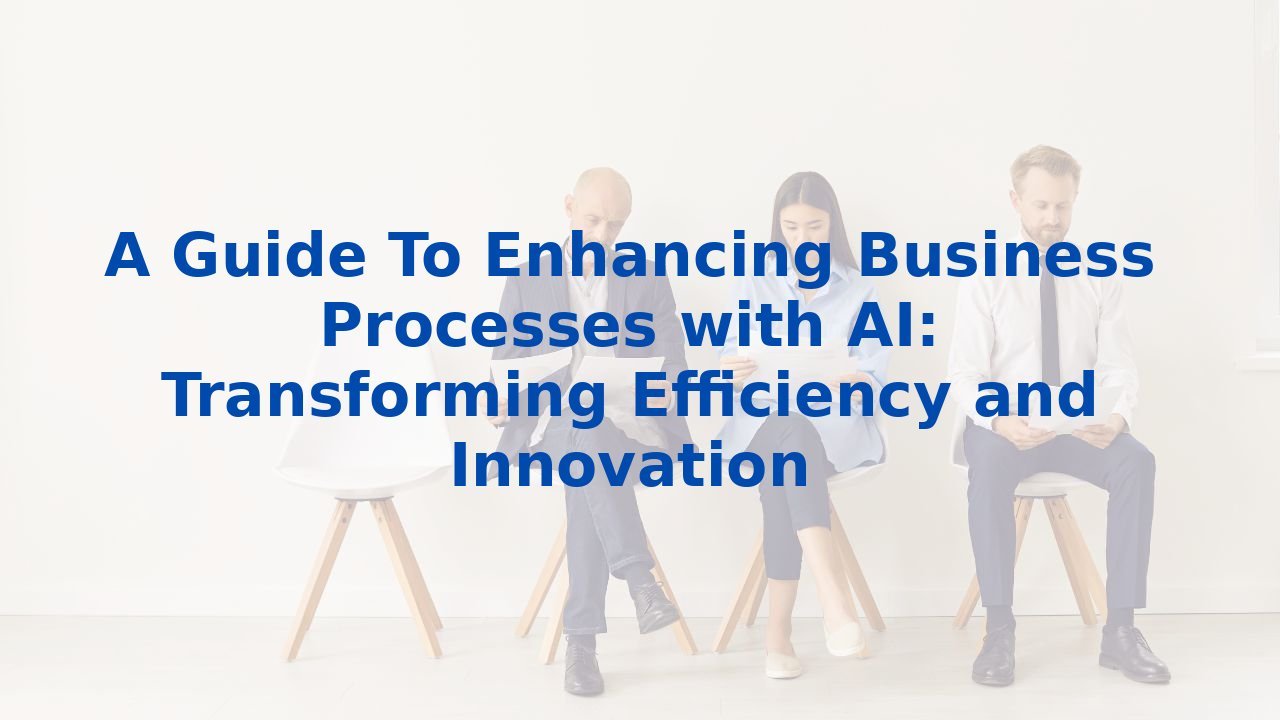A Guide To Enhancing Business Processes with AI: Transforming Efficiency and Innovation
A Guide To Enhancing Business Processes with AI: Transforming Efficiency and Innovation
In an age characterized by relentless change, businesses are on a perpetual quest to refine operations, boost efficiency, and spark innovation. Artificial Intelligence (AI) stands as a monumental ally in this journey, revolutionizing business processes in a multitude of ways. Let’s explore the various avenues through which AI can amplify your business processes and the profound benefits it can offer in terms of operational efficiency.
Understanding Business Process Management
At its core, Business Process Management (BPM) is the art of systematically overseeing processes to elevate their efficiency and effectiveness. It involves several stages: from discovery and mapping to automation, management, and continuous improvement. In this intricate landscape, AI emerges as a game-changer, providing opportunities to enhance every phase, leading to unprecedented operational excellence.
Process Discovery: Unveiling Hidden Efficiencies
The journey toward efficiency begins with robust process discovery. Utilizing AI-driven methodologies—such as process mining, pattern recognition, and natural language processing—organizations can shine a light on their existing workflows. This scrutinization reveals inefficiencies that traditional human analysis might overlook. By identifying bottlenecks and redundancies, AI aids in optimizing operational models, paving the way for a more streamlined future.
Process Mapping: Keeping Documentation Current
In the world of BPM, maintaining current documentation is critical. Here, AI takes on a vital role; it assists process analysts in evaluating real-time data to produce accurate and up-to-date process maps. This automation of documentation alleviates time constraints, allowing teams to focus their energy on strategic initiatives, rather than getting bogged down by repetitive tasks.
Process Automation: The Workhorse of Efficiency
When it comes to tangible applications, AI shines brightest in the realm of process automation. With tools powered by Robotic Process Automation (RPA), mundane, rule-based tasks—ranging from data entry to customer support—can be executed with remarkable precision and speed. AI-driven automation not only operates around the clock but also liberates human talent to engage in higher-order, strategic work, thus maximizing the value of the workforce.
Process Management: Continuous Monitoring and Improvement
The transformational capacity of AI extends to continual process management. AI-powered systems can perpetually monitor workflows, drawing insights from historical data to preemptively address potential issues. This proactive stance ensures that disruptions are mitigated before they can escalate, promoting seamless operational flow. Additionally, AI equips businesses with data-driven insights, predictive modeling, and root cause analysis—all essential tools for fostering sustainable improvements.
Benefits of AI Integration
Embracing AI integration into business processes unveils a treasure trove of benefits, including:
- Enhanced Accuracy: AI algorithms excel in analyzing data with precision, effectively reducing errors and bolstering informed decision-making.
- Operational Efficiency: By automating repetitive tasks, AI liberates valuable time and resources, ultimately leading to heightened operational efficiency.
- Cost Reduction: The automation capabilities of AI not only reduce the need for manual intervention but also optimize resource allocation, paving the way for significant cost savings.
- Improved Decision-Making: AI provides timely insights through advanced analytics, empowering businesses to make data-driven decisions that uncover new avenues for growth.
- Enhanced Customer Satisfaction: With AI, customer experiences are enriched through personalized interactions, accelerated response times, and superior accuracy in service delivery.
Training Employees for AI: A Key to Success
While the prowess of AI is undeniable, its full potential is unleashed only when employees are adeptly trained to harness its capabilities. Here are several vital components of effective AI training:
- Understanding AI Tools: Employees must grasp the operation of AI tools to leverage them effectively, thus enhancing task automation and operational efficiency.
- Data Analysis Skills: Empowering the workforce to analyze AI-generated data equips them with the ability to make impactful, data-driven decisions.
- Adaptability: Training ensures that employees are well-versed in navigating evolving processes and technologies, facilitating a smooth integration of new tools.
- Continuous Learning: Cultivating a culture of ongoing education fosters an environment where employees can continuously expand their skill sets, keeping pace with advancements in AI.
By prioritizing comprehensive AI training for employees, organizations unlock the potential for enhanced productivity, strategic decision-making, and sustained growth.
Conclusion
In summary, AI is not just a technological advancement; it is a transformative force that has the power to redefine business processes for the better. From process discovery to management, automation to iterative improvement, AI can smooth the road towards operational excellence and innovation. Furthermore, investing in employee training ensures that businesses capitalize on these innovations, driving continued adaptability in a rapidly evolving marketplace. As we look forward, adopting AI as a fundamental aspect of business operations will be crucial for staying relevant and thriving in a competitive landscape.



